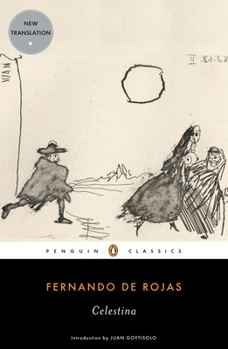Celestina
Select Format
Select Condition 
Book Overview
Edici n dual en tapa blanda, en castellano antiguo y moderno. La Celestina es el nombre con el que se ha popularizado la Tragicomedia de Calisto y Melibea, atribuida a Fernando de Rojas. Su composici... This description may be from another edition of this product.
Format:Paperback
Language:English
ISBN:0143106090
ISBN13:9780143106098
Release Date:December 2009
Publisher:Penguin Publishing Group
Length:240 Pages
Weight:0.60 lbs.
Dimensions:0.6" x 8.3" x 6.7"
Age Range:18 years and up
Grade Range:Postsecondary and higher
Customer Reviews
5 ratings
From Falstaff to Figaro and Beyond ...
Published by Thriftbooks.com User , 15 years ago
... all the European literature of 'lovable' old rogues and sly servants owes something to this fundamental classic of Spanish literature. Published in 1499, a century before Don Quixote, half a century before Lazarillo de Tormes, La Celestina has been regarded as "the first European novel." It could just as well be taken as the last Renaissance classical dialogue, however, since its structure owes more to the neo-Platonists and Humanists like Eramus or Pico della Mirandola than to any earlier prose. It's either a novel-in-dialogue or a very long play. The site of its first scene, a private garden in Salamanca, is still revered and maintained as a tourist attraction for Spaniards. "Celestina" is an old bawd, a fat lusty, greedy brothel-keeper, restorer of maidenheads, procurer of virgins, maker of love potions. The two sly servants of the lovesick nobleman, Calisto, have been acquainted with her since their childhoods; they know the best and the worst of her. Melibea, sole daughter of a family of note, is the object of Calisto's infatuation and of Celestina's wiles. The whole affair is rollickingly funny, in the raunchiest vein of Chaucer or Boccaccio, until the cascading tragedy of the conclusion: a murder, an execution, a fatal accident, and a suicide all in the last few pages. As you'd expect in a Renaissance dialogue, there are extended philosophical discourses, some astringently ironic, some sincerely worldly-wise. Leslie Byrd Simpson has given us quite a readable, enjoyable translation into modern but not slangy English. If you can't read Spanish at all, this is the little edition to get; if you have some Spanish and choose to struggle, I'd recommend one of the bi-lingual editions, and if your Spanish is good, well, chances are you've already encountered La Celestina. Spanish in 1499 retained a lot of the flexibility of word order of its Latin roots; you'll find verbs at the ends of sentences and other such inversions, but the vocabulary and inflections are closer to modern Spanish than 15th C English is to modern American. In any format, in any language, it's a book you ought to know, and it's only a fraction of the length of Don Quixote!
Excellent work.
Published by Thriftbooks.com User , 16 years ago
The book is EXCELLENT by Catedra which analyzes the 'obra' in detail. Excellent book and great story by Rojas and his crtizers.
A forgotten and ignored classic
Published by Thriftbooks.com User , 24 years ago
Celestina is amusing, ironic, and while the prose and dialogue is long and descriptive, it is never boring- I really enjoyed this play.
A forgotten and ignored classic
Published by Thriftbooks.com User , 24 years ago
Celestina is amusing, ironic, and while the prose and dialogue is long and descriptive, it is never boring- I really enjoyed this play. A note to the person who claims to be the author: Celestina was written in 1499, and it is widely assumed the author lived circa the same time. So, congratultions on your 500th birthday. :)
It captures the essance of good and evil in love.
Published by Thriftbooks.com User , 25 years ago
Fernando De Rojas captures the truth of the love between man and woman in a time when novels were rarely written. This book plays out of a drama that inhabits the first concepts of the tragedy of love. It is what books like Romeo and Juliet are compared to.




